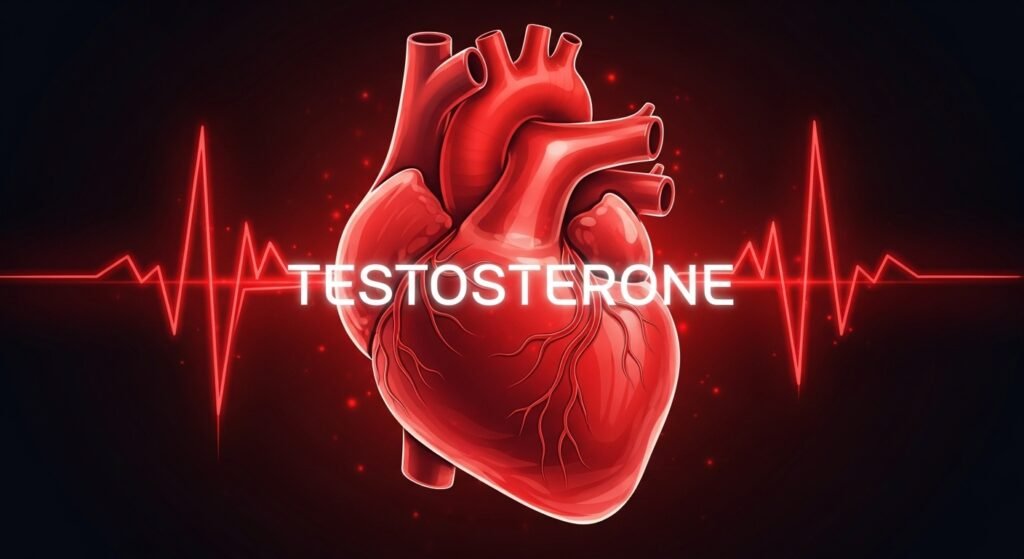Testosterone and Cardiovascular Health: Latest Study Decoded
Unpacking the Nuances of Male Hormones and Cardiovascular Well-being
The intricate relationship between testosterone and cardiovascular health has been a nexus of intense scientific debate, public confusion, and evolving medical understanding for many years. For countless men acutely concerned with their vitality, longevity, and overall health, pressing questions frequently arise: Does optimal testosterone protect the heart, or could it potentially pose risks? Can strategically managing male hormones genuinely impact your cardiovascular future, especially regarding testosterone and cardiovascular health?
Recent, robust research has begun to decisively illuminate this complex interplay, moving far beyond outdated misconceptions to present a more comprehensive and nuanced picture. This extensive guide is meticulously designed to decode the latest study findings, providing unparalleled clarity on what contemporary science strongly suggests about testosterone and heart health, and, critically, what these groundbreaking insights truly signify for your long-term well-being and male vitality.
The Longstanding Debate: A Brief History of Cardiovascular Concerns
Historically, initial discussions and early scientific inquiries surrounding testosterone and its influence on the heart were frequently overshadowed by smaller, less rigorous studies and isolated case reports. These preliminary findings, while limited in scope, unfortunately raised significant alarm bells about potential adverse cardiovascular risks, particularly in contexts involving Testosterone Replacement Therapy (TRT). These initial concerns, though often unsubstantiated by larger data sets, unfortunately led to widespread medical caution and understandable public apprehension, implying that higher testosterone levels might definitively lead to an elevated risk of myocardial infarctions, cerebrovascular accidents (strokes), or other severe adverse cardiac events.
However, as the precision of scientific methodologies dramatically advanced, and larger, significantly more robust and meticulously designed studies progressively emerged, much of this initial apprehension concerning testosterone and cardiovascular health began to undergo critical re-evaluation. The prevailing scientific narrative has compellingly shifted from a simplistic “testosterone is bad for the heart” to a far more intricate and evidence-based understanding of how hormonal levels, pre-existing underlying health conditions, and specific therapeutic interventions might interact within the complex cardiovascular system.
Decoding the Latest Research: What New Studies Are Unveiling About Testosterone and Cardiovascular Health
Modern, cutting-edge research focusing on testosterone and cardiovascular health has yielded pivotal insights, frequently leveraging much larger patient cohorts, advanced statistical analyses, and more rigorous, controlled clinical designs. A substantial and growing body of contemporary evidence now overwhelmingly points towards a more favorable, or at the very least, a neutral relationship between healthy testosterone levels and cardiovascular outcomes than previously surmised.
For instance, numerous large-scale meta-analyses and extensive observational studies have consistently indicated that low testosterone (Low T) levels are frequently associated with an increased prevalence of cardiovascular disease and elevated rates of all-cause mortality. It is critical to note that while this correlation is strong, it doesn’t definitively imply that chronically low testosterone directly causes heart disease; rather, low T is often recognized as a significant biomarker or an underlying indicator of broader systemic poor health or existing metabolic dysfunction.
Furthermore, recent, meticulously designed and highly controlled clinical trials have, by and large, robustly failed to demonstrate a statistically significant increased risk of major adverse cardiovascular events in men undergoing TRT. This holds particularly true when testosterone therapy is administered rigorously and appropriately selected men with clinically diagnosed hypogonadism (a genuine medical condition where the body’s natural capacity to produce sufficient testosterone is impaired). In fact, a subset of these studies has even tentatively hinted at potential beneficial cardiovascular effects within these precisely defined patient populations, contributing positively to the overall understanding of testosterone and cardiovascular health.
- For a comprehensive overview, refer to a meta-analysis or review published in a reputable journal. Example: Endocrine Society Clinical Practice Guideline on Testosterone Therapy in Men with Hypogonadism (Importante: Verifique se o link não está como “nofollow” no WordPress. Para um link de autoridade como este, ele deve ser “dofollow”.)
How Testosterone Mechanistically Impacts Cardiovascular Health: The Complex Interplay
The precise biological mechanisms through which testosterone exerts its influence on the intricate cardiovascular system are profoundly multifaceted and continue to be comprehensively elucidated by ongoing research. Testosterone, as a pivotal male hormone, can exert both direct and indirect effects on various critical components vital for robust heart health and vascular integrity:
- Vascular Function Enhancement: Testosterone has been observed to potentially improve endothelial function—the crucial health and responsiveness of the inner lining of blood vessels. This can promote vasodilation (the widening of blood vessels), leading to optimized blood flow and improved overall vascular health.
- Lipid Metabolism Regulation: It possesses the capacity to influence beneficial cholesterol profiles, potentially leading to a reduction in detrimental LDL (“bad” cholesterol) and triglycerides, while simultaneously fostering an increase in beneficial HDL (“good” cholesterol) in specific individuals. It’s important to note that these effects can vary based on individual physiological responses.
- Insulin Sensitivity Improvement: Testosterone plays a fundamental and often understated role in the regulation of glucose metabolism. Critically, low testosterone levels are frequently associated with increased insulin resistance, a direct and significant precursor to the development of type 2 diabetes. Type 2 diabetes, in turn, is a paramount independent risk factor for a myriad of cardiovascular complications.
- Anti-inflammatory Properties: Emerging evidence suggests that testosterone may harbor intrinsic anti-inflammatory properties. By potentially mitigating systemic inflammation—a key pathological contributor to the progression of atherosclerosis (the hardening and narrowing of arteries)—testosterone could indirectly confer cardiovascular protection.
- Beneficial Body Composition Shifts: Healthy, optimal testosterone levels are consistently associated with a favorable reduction in overall body fat mass and a concomitant increase in lean muscle mass. Both of these compositional changes are undeniably advantageous and confer direct benefits for long-term heart health and metabolic efficiency.
- Blood Coagulation and Clotting Factors: Some earlier concerns focused on potential impacts on blood viscosity and clotting dynamics. However, the preponderance of robust newer data generally indicates that any potential risk in this domain, if it exists at all, is exceedingly low and is typically manageable with appropriate and vigilant medical monitoring.
Who is at Risk? Understanding the Nuances of Low T and Heart Disease Risk
It is absolutely crucial to draw a clear distinction between the physiological, often natural, decline in testosterone levels associated with the aging process in men and the clinical diagnosis of genuine hypogonadism. While lower testosterone levels are frequently observed in men already presenting with pre-existing cardiovascular disease, obesity, or type 2 diabetes, it is imperative to recognize that these lower levels are often a consequence or an accompanying marker of these established conditions, rather than being definitively identified as their primary causative agent.
Men who consistently experience a cluster of symptoms highly suggestive of Low T (such as persistent, unexplained fatigue, significantly reduced libido, difficulties with concentration, unexplained mood swings, noticeable increases in body fat, and a reduction in lean muscle mass) and subsequently receive a confirmed diagnosis of low levels through accurate blood tests, should engage in a thorough consultation with their healthcare provider. Addressing these symptoms, which might encompass comprehensive lifestyle modifications or, when medically indicated, TRT, could concurrently and indirectly confer significant benefits for cardiovascular health by ameliorating underlying metabolic dysfunctions and improving overall physiological resilience.

Is Testosterone Replacement Therapy (TRT) Safe for Your Heart? A Contemporary Perspective
The fundamental question of TRT safety, particularly concerning its potential impact on the heart, remains a paramount concern for both patients and clinicians. Based on the most current, rigorous, and robust scientific evidence available today, when TRT is prescribed with precision and appropriateness to men with a genuine, clinically established diagnosis of hypogonadism and conducted under stringent and continuous medical supervision:
- It is generally and consistently not associated with a statistically significant increased risk of major adverse cardiovascular events (such as a heart attack or a stroke). This finding has been corroborated by multiple large-scale studies.
- For a specific subset of men diagnosed with low T and concurrent metabolic issues (e.g., insulin resistance, obesity), carefully managed TRT might even tangencialmente contribute to measurable improvements in beneficial body composition (reduced fat, increased muscle), enhanced insulin sensitivity, and more favorable lipid profiles. These positive metabolic shifts could, in turn, exert a beneficial influence on overall cardiovascular health.
- Rigorous and proper monitoring remains the cornerstone of safe and effective TRT. Regular, scheduled follow-up appointments, periodic blood tests (to monitor testosterone levels, PSA, red blood cell count, and lipid profiles), and a comprehensive assessment of existing cardiovascular risk factors by a highly qualified physician are absolutely essential components of any safe and responsible TRT regimen.
Key Takeaways for Men: What This Means for Your Cardiovascular Health
The perpetually evolving and increasingly precise scientific understanding of testosterone and cardiovascular health conveys several undeniably vital messages for all men aiming to optimize their well-being:
- Do Not Dismiss Symptoms of Low T: If you consistently experience symptoms indicative of low testosterone, it is imperative to initiate an open and thorough dialogue with your physician. Getting accurately tested and proactively addressing the underlying issue, whether through impactful lifestyle modifications or medically indicated TRT, constitutes a critical component of comprehensive men’s health management and can directly influence your testosterone and cardiovascular health.
- TRT is a Medical Treatment, Not a Lifestyle Enhancer: Testosterone replacement therapy is a potent medical intervention specifically designed for the treatment of a clinically diagnosed condition (hypogonadism). It is unequivocally not a universal panacea for the aging process, nor is it a performance-enhancing supplement for individuals with naturally normal testosterone levels.
- Prioritize Holistic Heart Health Foundational Practices: While hormonal balance, including optimal testosterone levels, is undeniably important, the fundamental, bedrock principles of holistic heart health remain paramount and non-negotiable:
- Maintain a consistently balanced and nutrient-dense diet, focusing intently on whole, unprocessed foods.
- Engage in a routine of regular and varied physical activity, incorporating both cardiovascular and strength training elements. (For more on comprehensive male wellness, see our guide: Holistic Men’s Wellness: Beyond The Gym For A Balanced Life)
- Implement effective and consistent stress management techniques into your daily routine.
- Ensure you consistently achieve adequate amounts of high-quality, restorative sleep each night.
- Categorically avoid smoking and practice responsible, moderated alcohol consumption.
- Crucially, Always Consult Your Physician: The single most vital step in navigating your testosterone and cardiovascular health is to maintain an open, honest, and continuous dialogue with your trusted healthcare provider. Only a qualified doctor can accurately assess your individual cardiovascular risk factors, precisely interpret your testosterone check results, and judiciously guide you on the safest, most effective, and personalized path forward for your unique health profile. Do not, under any circumstances, resort to self-medication or rely solely on anecdotal evidence.
Take Informed Action for Your Heart: Your Journey to Optimal Male Vitality
The intricate relationship between testosterone and cardiovascular health is complex and continues to be deeply explored by scientific research, yet the current body of evidence empowers us with increasingly clearer and more actionable insights. By remaining vigilantly informed, actively embracing a proactive and holistic approach to male wellness, and consistently collaborating closely with your dedicated healthcare provider, you can make profoundly informed decisions that powerfully support both your critical hormonal balance and the long-term, robust health of your most vital organ. Take decisive control of your heart health journey today and step firmly onto the path towards a healthier, more vibrant, and comprehensively fulfilling future. (Consider also reviewing our foundational guide: The Ultimate Guide to Men’s Annual Health Check-ups: What Every Man Needs to Know)

